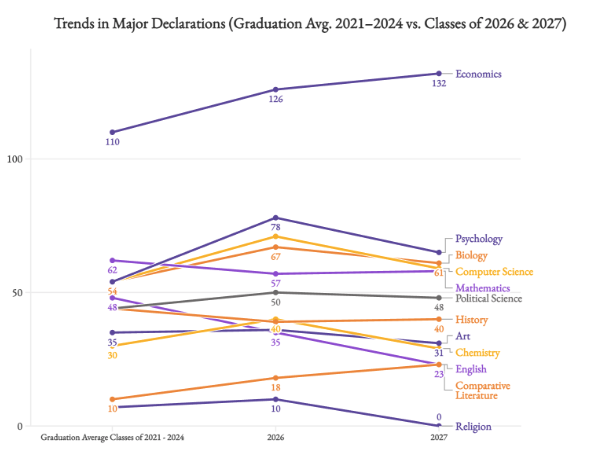Two staffing requests for tenure-track faculty in Asian American studies (AAS) were submitted on Friday, marking a key step toward the creation of an AAS program at the College. These requests, submitted by religion and American studies, come in the wake of a Curricular Planning Committee (CPC) working group report that strongly endorsed an AAS program and recommended that at least two tenure-track faculty be hired to teach primarily in AAS.
The requests were well received by Tyler Tsay ’19, co-chair of the Minority Coalition (MinCo) and member of the working group. “We’re very thrilled that these departments submitted requests for Asian Americanist lines,” he said. The requests, while a mandatory step for hiring, still face approval or rejection by the Committee on Appointments and Promotions (CAP).
Chair of American Studies Cassandra Cleghorn emphasized the importance of AAS for the American studies discipline. “Institutionally, American studies has long been supportive of the establishment of AAS at Williams,” she said. “American studies programs nationwide are often the institutional sites of ethnic studies programs.” In accordance with this national trend, American studies is focused on finding candidates with both strong knowledge of AAS specifically and broader knowledge of American studies. Cleghorn cited the CPC report’s recommendations as influential in the specific request that is being made – an open-rank, tenure-track faculty member.
Chair of Religion Jason Josephson Storm also confirmed the department’s submission of a staffing request for AAS. “I can say that we as a department believe that an Asian American studies candidate would find a good home in the religion department,” he said. Storm added that many current faculty members in the department, including Zaid Adhami, Jacqueline Hidalgo, Jeff Israel and Saadia Yacoob, study the discipline’s intersections with race in America. Storm also cited a pedagogical desire to see AAS on campus as rationale for the staffing request. “We are very much in support of broader curriculum changes at Williams, especially in terms of encouraging greater support for AAS and American studies, as well as ethnic studies more generally,” he said.
Numerous other departments were cited in the CPC working group report as having the potential to intersect with AAS, including “anthropology and sociology, economics, English, history, philosophy, political science and psychology.” These departments have not submitted staffing requests for AAS as of the Record’s deadline, but department and program chairs remain supportive of an AAS program. James Manigault-Bryant, associate professor of Africana studies, emphasized Africana studies’ continued support for the program and belief in the potential for interaction between the two programs. “I see a number of intersections between Africana studies and Asian American studies, including, but not limited to: the ways Asian Americans draw from hip hop to develop racial and ethnic identities or how Asian cultures are integrated into American hip hop; representations of Black and Asian American relationships in popular culture and the histories of Black and Asian American coalition building,” he said. “The Africana studies department would have an interest in hiring along these lines.”
For departments who did not submit staffing requests for this year, additional requests can be filed next year in accordance with the working group’s recommendations, which called for two immediate tenure-track hires and an eventual third hire. If CAP does not fulfill the request, however, no additional faculty can be hired and no program can be formed. CAP will deliberate over appointment decisions in the upcoming months before ultimately making decisions in May. Denise Buell, dean of the faculty and chair of CAP, did not provide any official response to the requests, citing that neither CAP nor CPC members have been able to meet to review them yet. She did say, however, that the requests merited serious consideration. “Both the CPC and CAP take the CPC working group’s report very seriously, so it will certainly play a significant role the deliberations of both committees,” Buell said.
Tsay emphasized the importance of CAP’s approval in the pursuit of an AAS program. “The final approval of staffing requests rests solely on the CAP,” he said. “We are hopeful that the CAP holds to its word to follow the recommendations of the CPC Working Group’s report and approves both lines this year; we are working with members of the CAP to make sure that approval for the two lines is indeed fulfilled.” Tsay argued that, considering the impending retirement of Professor of History Scott Wong – who told the Record that he plans to retire following the 2022 spring semester – both requests would have to be fulfilled in order for an AAS program to take root. With both lines approved, however, a program could be built. Cleghorn also expressed cautious optimism for the fulfillment of the American studies request. “I hope the CAP is receptive,” she said. “We shall see! I do trust the process, however slowly it seems to move.”








